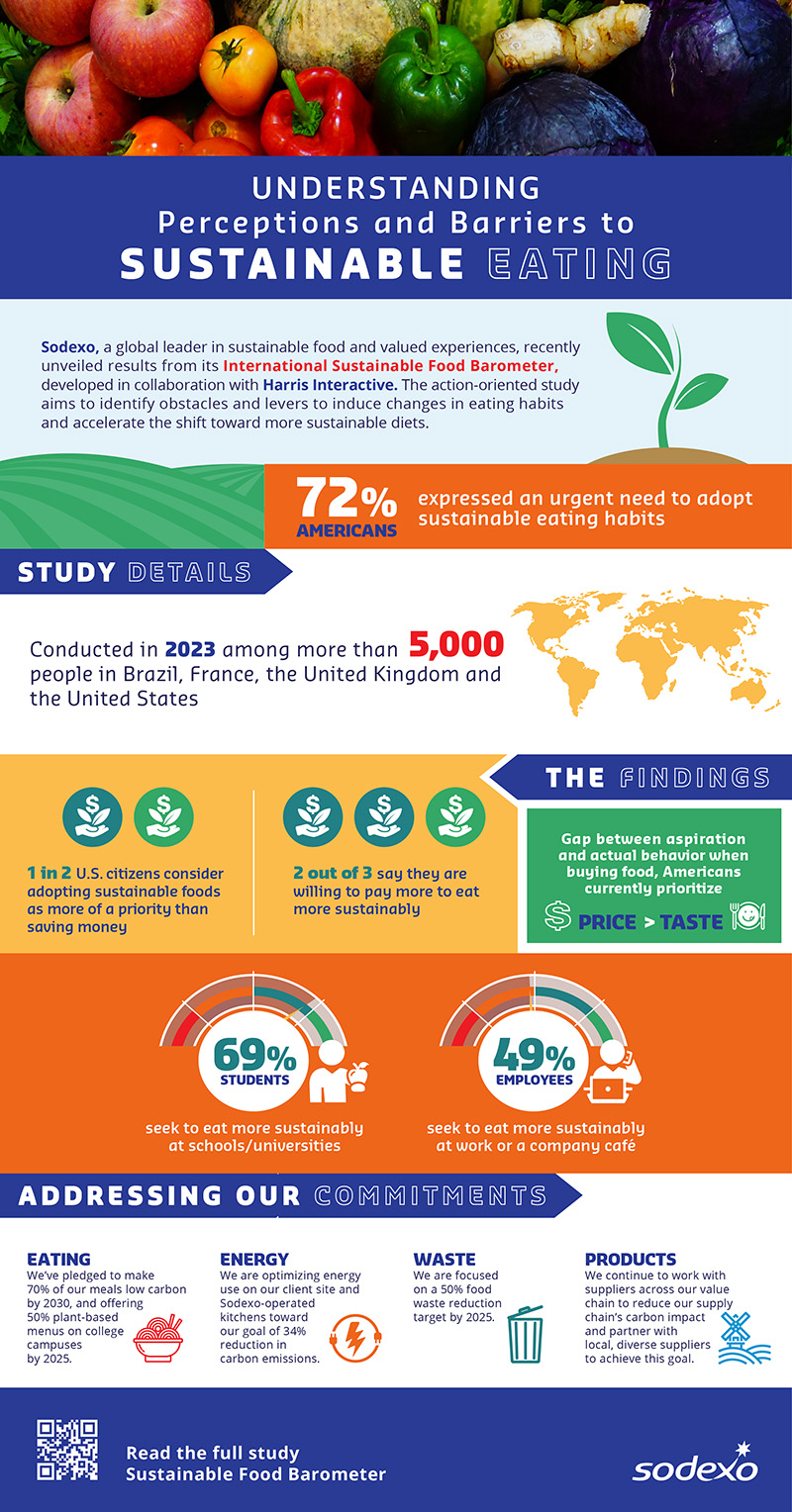Decoding Sustainable Eating in the US: Sodexo’s International Report Reveals Overarching Positive Perception Toward Climate-Friendly Habits

In our fast-changing world grappling with the effects of climate change, the need for sustainable dining practices has gained significant momentum. The newly released Sustainable Food Barometer, an action-oriented study led by Sodexo in partnership with Harris Interactive, sheds light on the perceptions and behaviors of more than 5,000 people in the United States, the United Kingdom, France and Brazil. The findings highlight the urgent need expressed by 75% of respondents overall to adopt more sustainable eating practices. Yet the barometer finds that this urgency has yet to translate into widespread behavioral change, revealing a crucial gap between aspirations and actions.
Breaking Down Barriers When It Comes to Sustainable Eating
This gap presents a unique opportunity for Sodexo, a global leader in delivering sustainable food and valued experiences. Among U.S. respondents, 72% of Americans expressed the need to adopt sustainable eating, with 1 in 2 U.S. citizens considering adopting sustainable foods a higher priority than saving money, and 2 out of 3 respondents saying they are willing to pay more to eat more sustainably. For Sodexo, supporting this shift towards sustainable dining is an integral part of the company's commitment to corporate and social responsibility, as outlined in its latest sustainability report.
“Sodexo aims to become the global leader in delivering sustainable food and valued experiences at every moment in life as we learn and play, work and heal,” said Sarosh Mistry, President and CEO, of Sodexo North America. “To better understand the global appetite for sustainable food, we launched the first international sustainable food barometer to gather insight into the aspirations, obstacles and concrete reasons associated with an individual’s adoption of sustainable eating. This study showed Americans have a largely positive view of sustainable food, but there is an opportunity to motivate more people in our country to overcome barriers to adopting a sustainable diet.”
Increasing Accessibility and Reducing Food Waste
Sodexo recognizes that accessibility is a key factor in driving sustainable food choices. Husein Kitabwalla, CEO of Tech & Services and Food Transformation for Sodexo USA, stresses the importance of community partnerships, technology, and local sourcing.
“Throughout my career, I have helped countless companies transform their operations. Collaborating with local suppliers and businesses will make your company stronger, more diverse in its capabilities, and more relevant to the communities you serve,” Kitabwalla says.
Another topic Kitabwalla is passionate about is reducing food waste. According to the Sustainable Food Barometer, 6 out of 10 U.S. citizens say they are already reducing food waste, with half declaring they buy local produce when they can.
“At Sodexo, we've found a recipe to drive less waste and increase food donations: community partnerships plus technology,” Kitabwalla said. “It takes people who are passionate about driving change to achieve clear targets for waste reduction. For me, food waste shrinkage is not just a data point. Conservation is my lifestyle — I know what it's like to experience scarcity. I'm proud to work for a corporation that is committed to reducing food waste by 50% by 2025, but we have a responsibility as individuals to take action whenever we can,” he said.
On Campus: An Opportunity to Influence Sustainable Practices with Students
The greatest opportunity for Sodexo in North America lies in influencing individuals to eat more sustainably. The Sustainable Food Barometer reveals that students and employees are keen to adopt sustainable diets at schools, universities and workplaces.
“Although students value the many benefits of infusing more plant ingredients into their diets, they lead busy lives and need plant-based options that are convenient and flexible,” said Brett Ladd, CEO of the Campus segment for Sodexo USA. “In addition, dining is an experience, and meals should offer genuine enjoyment and opportunities to connect. That’s why Sodexo is mobilizing its resources to create plant-based options that meet consumers’ needs and make it easy for them to incorporate more plant-based foods into their lives. We are focused on improving the availability of plant-based dishes and creating delicious new recipes that consumers will be excited to try.”
Gen Zers are especially attuned to the environmental and physical benefits of plant-based eating; according to the Food Barometer, 69% of students seek to eat more sustainably. Currently, 36% of Sodexo Campus’ menus are plant-based, and the company is committed to increasing that number to meet this growing demand. The increase in Sodexo’s plant-based menus on campuses is due in large part to Sodexo’s collaboration with The Humane Society of the United States, according to Ladd.
“Through our partnership with the Humane Society, we are able to provide more plant-based menu offerings. We're collaborating on recipe development, menu ideas, nutrition advice and hands-on culinary training. With their support, I’m confident we can reach our 50% goal by 2025,” he said.
The Sustainable Food Barometer is an invaluable tool that highlights geographic and demographic-specific attitudes when it comes to climate-friendly eating. The report reveals that while Americans prioritize price and taste when buying food, environmental impact and local origin are deemed less crucial. Bridging this gap between priorities and behaviors is crucial to fostering a more sustainable food landscape, providing a road map for education, collaboration and innovative solutions.
To read more insights, read the full report here.
